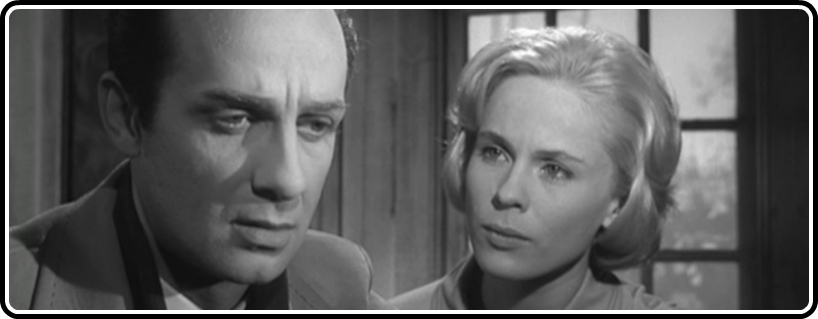
It’s been awhile since we looked at ol’ Ingmar Bergman here On the Hulu Channel, but not for lack of love – the man is my favorite filmmaker of all time, if such a thing can be quantified, and it’s always a joy to take a look at one of his films, especially, as in this case, if it’s brand new to me. Bergman made The Devil’s Eye hot on the heels of his 1960 Best Foreign Language Film Oscar-winner The Virgin Spring, and the one-two punch represents a major turning point for the filmmaker in several ways we shall discuss shortly.
Bergman concocts an Irish proverb – “A woman’s chastity is a sty in the Devil’s eye” – to suggest the course for his narrative, in which the Devil (Stig Järrel), bothered indeed by a sty in his eye, sends the damned Don Juan (Jarl Kulle) back to Earth to seduce a young woman (Bibi Andersson) in an effort to take not only her virginity, but her strong belief in love. It’s a hell of a premise for a Bergman comedy, which is what he rather explicitly advertises it to be (Gunnar Björnstrand narrates between acts, and, after providing a brief overview of Hell, says, “Here begins our comedy”), though also what from which he rather sharply deviates. Just as his dramas, no matter how grim, had more than their share of levity, The Devil’s Eye is rather unafraid of being genuinely troubling or moving, while still maintaining an air of comedy about the whole affair. In those days, Bergman was never afraid of cutting the morbidity with a zinger here or there, and, if one were to look at things in the classical tragedy/comedy dichotomy, there is little doubt that, for whatever he plays with along the way here, Bergman is essential working in comedy. Certainly by the time of its rather bawdy finale.
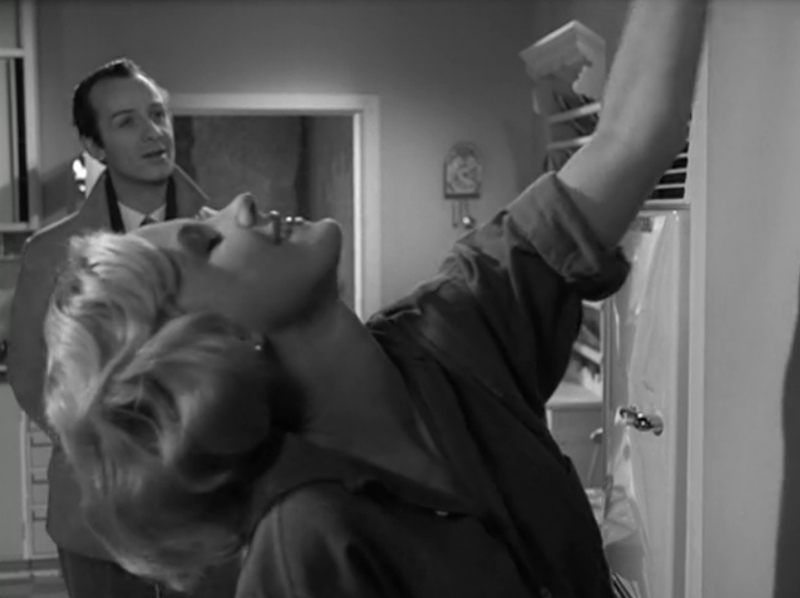
Bibi Andersson gets somewhat underrated as a Bergman protagonist, perhaps because, aside from Persona and possibly The Touch (I’ve not seen that one), she never really played a classic leading role. And yet I would argue that in The Seventh Seal, Wild Strawberries, and especially The Devil’s Eye, she is the film’s soul, the ballast that prevents the picture from dipping permanently into darkness. It’s not that she’s some ray of sunshine – though her smiling introductions may suggest otherwise, she frequently plays characters trapped in compromising, difficult situations, who nevertheless choose optimism, positivity, commitment, and, moreover, a kind of lasting happiness.
Here, Britt-Marie is the very image of incorruptible youth, yet, within minutes of meeting Don Juan, she is positively smitten with him, and not, one gathers from the kiss she accepts, in entirely platonic terms. Still, we never doubt the dedication she professes to her husband-to-be. We just recognize, as she comes to, how little life has had to offer her in a remote area of a remote country, and how far her physical appeal and spirited personality could take her, if she so chose. “Life would be so boring if you didn’t lie from time to time,” she tells Don. “The strange thing is people believe what you say…I don’t know, perhaps it’s sinful to play. Jonas says I mustn’t do it. That it’s cruel. But it’s so tempting. Especially with men. They almost beg for it. Play with me, lie to me, say what’s untrue and I promise to believe it all. ”
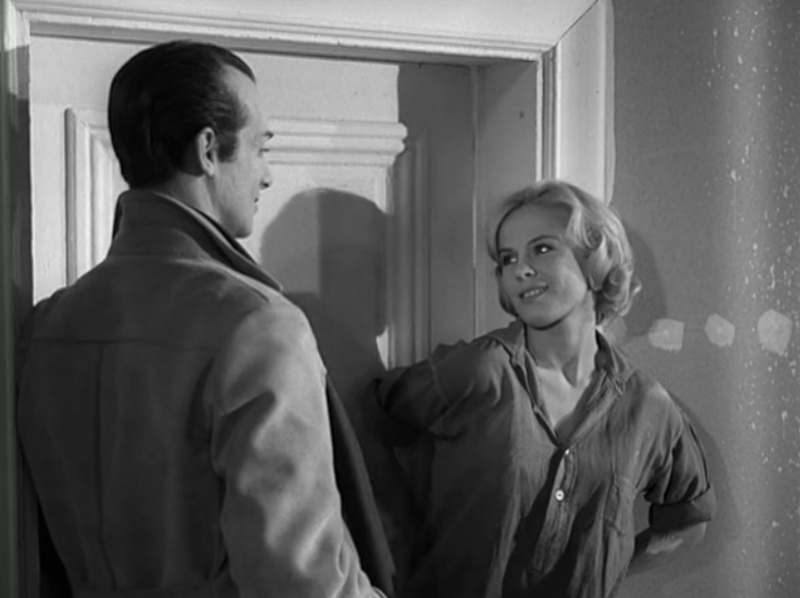
Andersson was a sublimely talented actress, capable of showing a sort of boundless joy to mask underlying doubt and sorrow, and when that mask finally breaks, we realize just how consuming those hidden emotions had become. While Harriet Andersson or Liv Ullmann, Bergman’s more acclaimed actresses, were forever in the grasp of their anxieties (or sometimes insanities), Bibi constantly held back the darkness with a smile, to varying degrees of success. The minute fluctuations of her eyes as she aches for love, to be understood, are the very essence of cinema, Bergman’s especially.
Antonioni once noted that women make especially fine protagonists through which to sift the unclear agonies of existence, and Bergman tends to bear that out as well. His men are almost always troubled by very definite obstacles – a troubled wife or daughter, strange visions, a harsh father, the threat of nuclear war – while his women face loneliness, longing, marginalization, aging, and regret; obstacles that have a definite, tangible presence yet cannot be conquered. Much of this comes through in the fact that the men are relatively mobile, capable of changing their life circumstances on a whim (in fact, Wild Strawberries, which most closely has a man faced with a more feminine conflict, still takes place along a road trip that same man spontaneously decided to take), while the women are rooted to various men in their lives – typically husbands or fathers, but sometimes employers (Secrets of Women is all about four women sharing stories that express their struggles, largely out of lack of anything else to do while waiting for their husbands to return). The clearest distillation of the difference of these two expressive modes is in considering The Seventh Seal alongside Cries and Whispers. Both portray people coming into conflict with the inevitability of death, but where the former illustrates this by having a man play chess with death, even knowing he’ll lose, the women in the latter have to sit and watch their sister slowly succumb to disease while facing their own mortality.
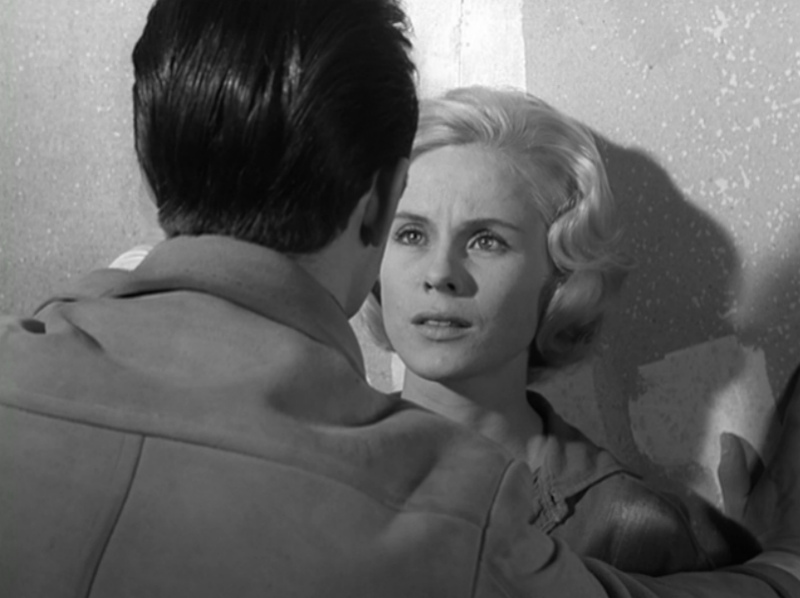
Britt-Marie’s father, known only as The Vicar (Nils Poppe, who ironically played Bibi Andersson’s husband in The Seventh Seal), is a kind but fairly simple man whose wife, Renata (Gertrud Fridh), is suffering some unnamed, chronic illness. Like her daughter, she is plagued by many temptations and doubts, especially from Don’s servant, Pablo (Sture Lagerwall), who, despite being warned by the Devil himself, is determined to see a little action while he’s on Earth. The Vicar provides for Renata, gives her a comfortable home and all the affection she could want, but somehow the two are just unable to connect, as much for his inability to see that what truly afflicts her, beyond her illness, cannot be solved so easily. “Help me figure out my wife,” he prays, touchingly. “It’s difficult to see her suffer and not know how to help.” Much of the internal struggle of the film comes from men faced with a definite challenge, but suddenly unsure of how to overcome it – Don Juan, in fact, falls in love with Britt-Marie, to the point that he would take no pleasure in sleeping with her behind her fiancée’s back, even though it would be a simple task for him. Earlier Bergman had little trouble knowing the correct course of action, but little by little, the path is becoming obscured.
The path would get completely paved over as Bergman moved into the 1960s, and, as I mentioned way back at the top of the post, The Devil’s Eye is a huge transition point for him. He moved sharply away from these sort of magical-realist films, rarely outright removing the spiritual realm, but more hinting or suggesting its presence rather than outright portraying it. Goals and solutions become much murkier, as mental illness, abuse, violence, and war became more prominent points of focus. The bittersweet note he strikes at the end of The Devil’s Eye is familiar, but suggestive of so much of what was to come, even quite immediately with The Virgin Spring (both end on questionable moments of justice, though the latter in much graver terms).
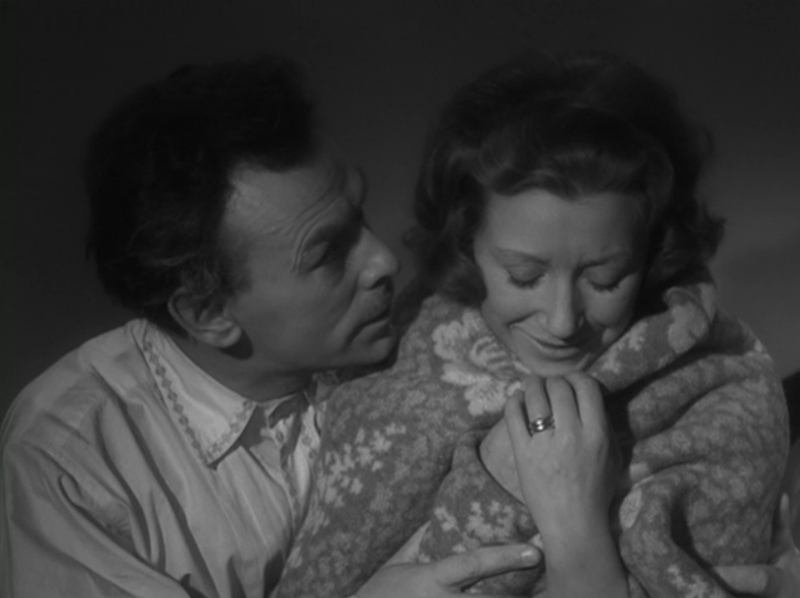
Collaboratively, this also became a hugely important transition point – The Devil’s Eye was the last film Bergman made with cinematographer Gunnar Fischer, who shot twelve of Bergman’s features between 1948 and 1960, including his most iconic and important of the period. Bergman had already embarked on his long, fruitful collaboration with Sven Nykvist with The Virgin Spring, and as great as Nykvist would be for Bergman, I’ve always had immense affection for Ficher’s high-contrast, very sculptural sense of lighting. Faces in his films have real dimension, a quality that sometimes gets lost on DVD but which becomes overwhelming when seen in 35mm, or now Blu-ray. Bergman’s more magic-realist elements find their perfect purchase in the world Fischer creates, and the idea of Death visiting or souls being sent up from Hell or the magic in The Magician may just be real.
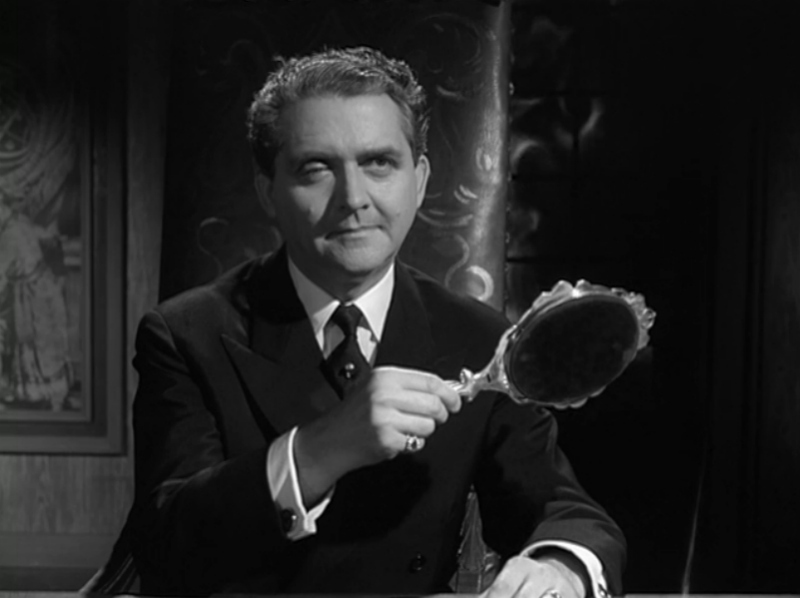
On their split, Bergman had this to say:
He’s an extraordinarily fine artist; a soft, silent, and introverted musician-type, always discussing, always diffident; while I become more and more domineering and over-bearing, and less and less pleasant to have to do with. He, more and more withdrawn; I, more and more aggressive. In The Devil’s Eye, this almost led to a total breakdown. If anything worked at all, it was because he’s an artist, because I could appeal to him all the time. But in my collaboration with him I was always unsure of myself, which I never am when working with Sven Nykvist.
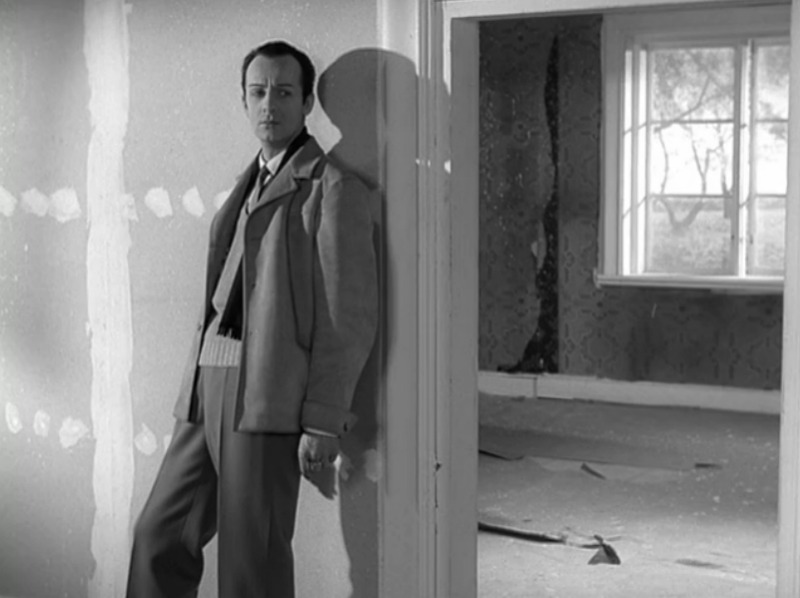
Fischer more or less agreed:
Ingmar has to have a sense of control over those he works with. He has to feel that his will is the decisive one… he could be rather hard many times. Verbal eruptions were common and quite humiliating at times. It was tough, for he demanded very, very much. You couldn’t let go for a moment when you worked for him – you worked under constant tension…. I don’t think it’s good to work under such tension. You were forced to work within a safety zone, you didn’t dare take any risks, show any audacity, it was like playing hockey in the defense zone the whole time. You didn’t score any goals that way. I am very grateful to have worked for Ingmar. But I don’t think I’d want it back. It was too much.
And, specially, regarding The Devil’s Eye:
Everything went wrong from the beginning. Ingmar didn’t feel well – he had stomach problems. Yes, on the whole, everything went wrong, you see. I wonder if he did not lose his grip on that film. I don’t know if it was always like this that Ingmar needed a scapegoat, but I happened to be the one in that film. Everything got worse and worse for me, you see, and I became upset and nervous and insecure. So I can’t think about that film with any great joy.
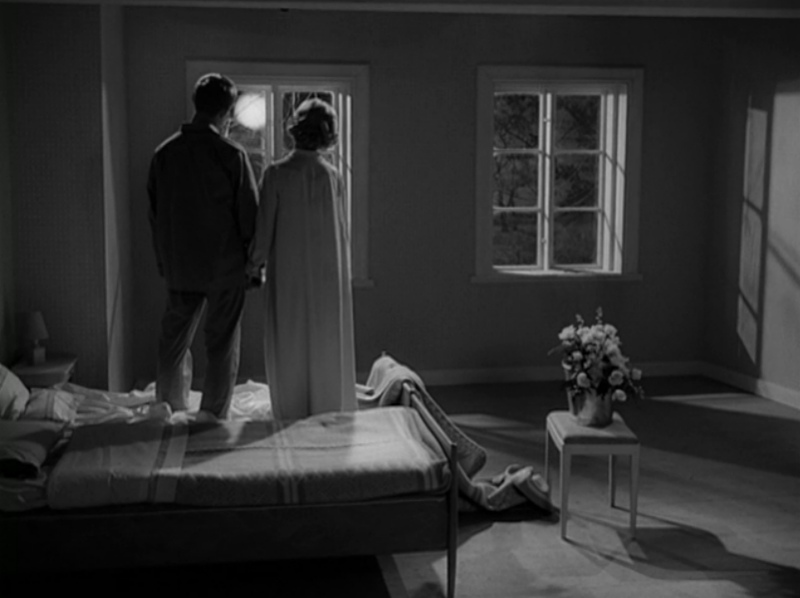
Though not available in HD, Fischer’s stunning contributions to The Devil’s Eye still look quite good in the SD transfer now available on Criterion’s Hulu channel. The contrast comes through beautifully, we just lose a bit in compression artifacts, and the edges are a little soft. Some detail gets lost in the wide shots, but Bergman’s great close-ups look pretty magnificent. A late night, heavy-contrast conversation between the Vicar and his wife looks especially rich. On the whole, this is very strong for an SD transfer, and the print utilized is quite free from blemish and damage. Audio is similarly clean and unremarkable.
Bergman doesn’t seem to be alone in considering The Devil’s Eye lesser Bergman, but I would put it up there with, if not above, some of his other mid-tier films that Criterion has released, like The Magician or Summer Interlude, so I hope they’re considering this for a main line release at some point. Not only would it look tremendous on Blu-ray, but, as I hope I’ve demonstrated here, there’s more than enough to dive into for special features. A fuller look at the production cycle, which Taschen’s indispensable Ingmar Bergman Archives only dips into, would be greatly appreciated, and it’s high time that Fischer got some attention in the supplements, having shot six films in the collection, as well as three Eclipse titles, never mind contributing a permanent mark on the history and iconography of cinema.
In the meantime, Bergman fans may rejoice at its availability on Criterion’s Hulu Channel, the home of so many great-but-neglected works. It may not be the upper crust of his capacities, but through it he reflexively expresses so much of what I love in his capacity for real vulnerability and transparency within a compelling dramatic framework. It’s beautiful and evocative, ponderous and quietly reassuring, and so consumed with how wonderful life is because of the flawed people we love so deeply.
To try Hulu Plus and get two weeks free, click here!



![Bergman Island (The Criterion Collection) [Blu-ray]](https://criterioncast.com/wp-content/uploads/2022/11/bergman-island-the-criterion-collection-blu-ray-400x496.jpg)
![This Is Not a Burial, It’s a Resurrection (The Criterion Collection) [Blu-ray]](https://criterioncast.com/wp-content/uploads/2022/11/this-is-not-a-burial-its-a-resurrection-the-criterion-collection-blu-ray-400x496.jpg)
![Lars von Trier's Europe Trilogy (The Criterion Collection) [The Element of Crime/Epidemic/Europa] [Blu-ray]](https://criterioncast.com/wp-content/uploads/2022/11/lars-von-triers-europe-trilogy-the-criterion-collection-the-element-of-400x496.jpg)
![Imitation of Life (The Criterion Collection) [Blu-ray]](https://criterioncast.com/wp-content/uploads/2022/11/imitation-of-life-the-criterion-collection-blu-ray-400x496.jpg)
![The Adventures of Baron Munchausen (The Criterion Collection) [4K UHD]](https://criterioncast.com/wp-content/uploads/2022/11/the-adventures-of-baron-munchausen-the-criterion-collection-4k-uhd-400x496.jpg)
![Cooley High [Criterion Collection] [Blu-ray] [1975]](https://criterioncast.com/wp-content/uploads/2022/11/cooley-high-criterion-collection-blu-ray-1975-400x496.jpg)